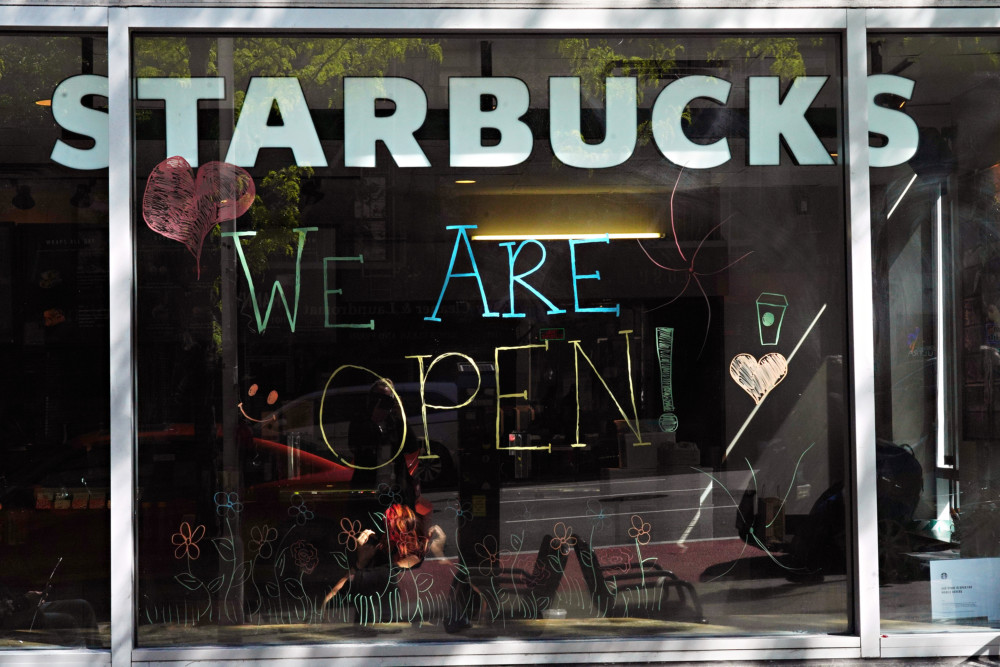By Katherine Khashimova Long
The Seattle Times
WWR Article Summary (tl;dr) As Katherine Khashimova Long reports, “Starbucks demanded the rent relief one day after the company announced it would reopen 90% of its 8,900 company-owned U.S. stores by early June.”
Seattle
Starbucks wants landlords to give it a break on rent for at least a year as coronavirus social-distancing measures batter sales at the Seattle-based global coffee chain.
“Effective June 1 and for at least a period of 12 consecutive months, Starbucks will require concessions to support modified operations and adjustments to lease terms and base rent structures,” read a May 5 letter to landlords, signed by Starbucks Chief Operating Officer Roz Brewer.
Starbucks demanded the rent relief one day after the company announced it would reopen 90% of its 8,900 company-owned U.S. stores by early June.
In a May 4 post on Starbucks’ website, President and CEO Kevin Johnson wrote that Starbucks “will not just survive, but with adaptations and new routines, it will thrive.”
The letter to landlords struck a more dire tone, asking them to “adapt to new realities”, including an anticipated $225 billion hit to the American restaurant industry over the next three months.
The company called the closure of many businesses to slow the spread of the novel coronavirus “a staggering economic crisis,” adding that “the psychological and economic scars will last for months, if not years.”
“This is the worst recession since the Great Depression and far more devastating than the global financial crisis,” Brewer wrote. “What lays ahead is daunting but by no means insurmountable with a shared commitment and a clear path forward.”
With more U.S. locations than nearly any other chain, Starbucks’ rent relief ask could have widespread ripple effects on commercial property and mortgage markets if implemented nationally.
Starbucks’ quarterly earnings fell by half from 2019, the company announced on an April 28 earnings call with investors, to $328.4 million. The company indicated it planned to ask for lease concessions from landlords on the same call.
Starbucks stayed current on its rent even while roughly half its U.S. stores were closed in March and April, Chief Financial Officer Pat Grismer noted during the quarterly earnings call.
“We are having ongoing conversations with our landlords in various markets regarding what may be commercially reasonable lease concessions in the current environment,” Grismer said then. “We’ve not yet confirmed those arrangements and it’s really premature to indicate what that relief may look like.”
A company spokesperson declined to confirm which markets are subject to its plan to renegotiate leases, but Starbucks landlords in Seattle and Tacoma said they had received the letter. None said Starbucks had yet made specific requests for rent relief.
Longtime Seattle property developer Fred Weiss, who owns the Pike Street building that houses the swank and massive Starbucks Reserve Roastery on Capitol Hill, said he’s taking a long-term approach to Starbucks’ leasing woes and the COVID-19 crisis in general. Commercial real estate in Seattle, he said, will recover, eventually.
“There’s a great adage … that underneath all is the land,” he said. “If you have land in downtown Seattle, guess what? The land is going to be there regardless of what happens up above it.”
The building is mortgaged, he said, but he plans to use cash reserves to cover payments to his lender until Starbucks is able to pay in full again.
Besides, he said, mortgages are like lease agreements: “They’re just contracts.”
Some business borrowers have already renegotiated their mortgage payment plans since the outbreak of the pandemic, said Billy Meyer, a commercial lender at Seattle-based Columbia Pacific Advisors. Mostly, borrowers are asking to defer payments for short periods of time, say, a month.
Meyer said uncertainty in the retail and dining sector is scaring off many lenders who might otherwise have financed property transactions, shrinking the commercial real estate market.
“If you have a retail or commercial space that’s vacant or the lease is expiring, we don’t really know if the tenant is coming back, or maybe they’re coming back at half the size,” he said.
As the coronavirus lockdown continues to pummel business, as many as 11.4% of King County dining and retail properties could be vacant by 2022, according to Moody’s. In Seattle’s core, commercial rents have already decreased 1% since the first quarter of 2020, according to the Downtown Seattle Association.
Some large retail and restaurant tenants have said they will withhold rent until landlords agree to new lease terms, including Lynnwood-based skate-apparel retailer Zumiez, which has more than 700 stores.
___
Distributed by Tribune Content Agency, LLC.














































































































































































































































































































































































